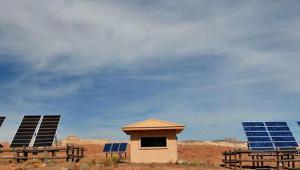The African Development Bank Group is backing the creation of distributed energy service companies that will bring power to 900,000 households – about 4.5 million people – by 2025.
The move promotes securitisation financing techniques to address barriers to accessing finance for solar power providers while supporting their growth and expansion.
“Accelerating access to universal, affordable, reliable, sustainable and modern energy for underserved populations requires innovative financing solutions,” said Wale Shonibare, the bank’s acting vice-president for power, energy, climate change, and green growth.
“Innovations such as receivables-backed financing structures provided by the program are vital in the bank’s efforts to unlock private sector participation and local currency financing for the energy sector.”
Conventional energy systems rely on heavily centralised assets such as power stations distributing electrical power through extensive grids by sending it across large distances.
The distributed energy service company (DESCO) provides access to energy by installing assets – such as solar systems or connection to a mini‐grid – near its customers’ homes or small businesses.
This new market‐driven approach collects payments from the customer for specific energy requirements such as sufficient electricity for lighting, the use of a television, computer or power for a shop.
A key advantage of this approach is that it can serve population sectors that do not require energy subsidies, freeing public resources to help the poorest households.
By providing DESCOs with access to new mechanisms to obtain the financing they need and local lenders with risk mitigation instruments to support them, the bank will support their growth.
The programme is expected to contribute to the installation of an estimated 45MW of distributed solar photovoltaic power providing clean energy for 900,000 households by 2025.
It will also create about 6,000 new jobs, mainly for young people, and help countries avoid the creation of nearly 37.08 kilotons of CO2 equivalent emissions per year.
Stefan Nalletamby, the bank’s director for financial sector development, said: “It will also promote financial inclusion by availing consumer financing to customers in rural areas, building credit history, and encouraging the uptake of mobile payment solutions.”













